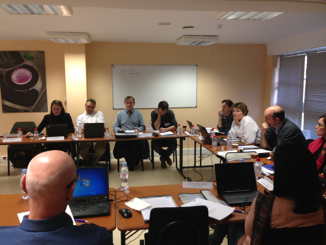Monitor and protect wildlife health in Europe
European working group establishing guidelines for the surveillance,
notification and management of priority threats in wildlife.
Experts : Marc ARTOIS (VetAgro Sup, France) , Jean Yves CHOLET (ONCFS, France),
Morgane DOMINGUEZ (France), Mike HUTCHINGS (Scotland's Rural College), Annick LINDEN (Université de Liège, Belgique),
Elodie MONCHATRE-LEROY (ANSES Nancy, France), Julien PORTIER (Sciences & Faunes, Moscou),
Marie-Pierre RYSER-DEGIORGIS (Vetsuisse Faculty, Berne, Suisse), Patricia TAVARES SANTOS (DGAV Portugal),
Wim HM van der POEL(Université de Lelystad, Pays bas), Eva WARNS-PETIT (DDPP Rennes, France).
NB: the experts were selected and contacted by the president of the group, for their recognized competences
in their respective disciplines and to cover the whole field of European wildlife health.
The experts were recruited “intuitu personae” and not for their institutional links.
Their propositions do not necessarily reflect the views of their employers.
Organizing committee
Lisa CAVALERIE (DGAL, France), Fabrice CHEVALIER (DRAFF Bourgogne, France).
Claude GRANDMONTAGNE (ASA), Jean Marie GOURREAU (ASA).

ASA proposed to the DGAL (Direction of the French ministry for Agriculture) to support the creation of a working group
for proposing guidelines for the surveillance, notification and management of priority threats for wildlife.
This proposal was validated as a DGAL-ASA agreement.
The questions addressed
The group met on October 28, 29 and 30 2015 in the ASA headquarters in Maisons-Alfort and addressed the following topics:
- Which are the parties implicated in the sanitary surveillance of wildlife in France (and in part in Europe):
data providers, specialized laboratories, data managers, and data users?
-
Which are the sanitary threats which should be considered as priorities for surveillance in France and in Europe, for wildlife?
- In which form, and by whom, should notifications of pathogens and diseases of wildlife be made, in France and in Europe?
-
Which should be the political response to the discovery of an outbreak of one of these pathogens in wildlife?
-
Is there a directory of recognized experts in wildlife health and management? (and how to establish such a directory if necessary?)
-
Which are the main sanitary or medical options available after the discovery of an infectious event in wildlife?
-
Is it possible to establish a decision frame for setting up emergency, waiting, protection, prevention and mitigation measures and communication?
Methodology

The first two days of the meeting were dedicated to confronting ideas on the proposed topics and resulted in proposing
a method for addressing the management of threats in wildlife health.
This method was validated and completed on the third day in split sessions by using precise examples and entering them into the method.
Direct, indirect and vector-borne diseases were addressed each separately.
Several experts remained after the official termination of the meeting to take part in the initial writing of the meeting report (after-noon).
Professor Marc Artois (president) and Dr Julien Portier (secretary) then elaborated a report in English,
from notes taken during the meeting and commentaries made by participants.
The original report was then translated in French to be presented to the DGAL (contact: Animal Health Office)
The report can be downloaded from this page (in french only). It is preceded by a two page summary presenting the key comments and recommendations of the report
Propositions
Mainly, the experts recommend taking into considerations all management options to mitigate the transmission risk for diseases,
starting when relevant with those applicable directly to humans, then to livestock in contact with infected wildlife.
A detailed annex at the end of the report proposes a commented list of all prevention or mitigation measures for infectious events
affecting humans or livestock and implicating wild free living animal populations.
Download the report in french
A scientific article (English) is currently being written.
ASA will ensure its publication in an international peer-reviewed journal.


